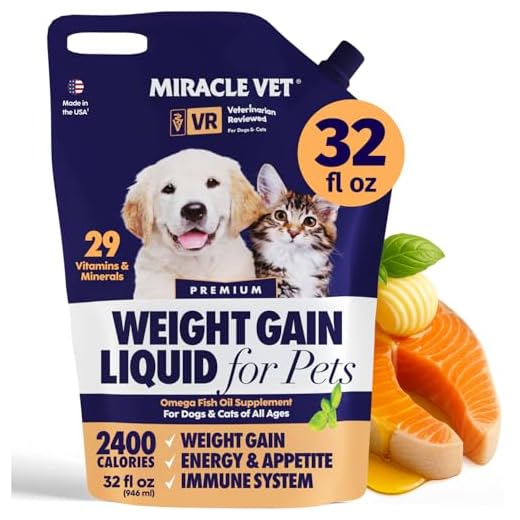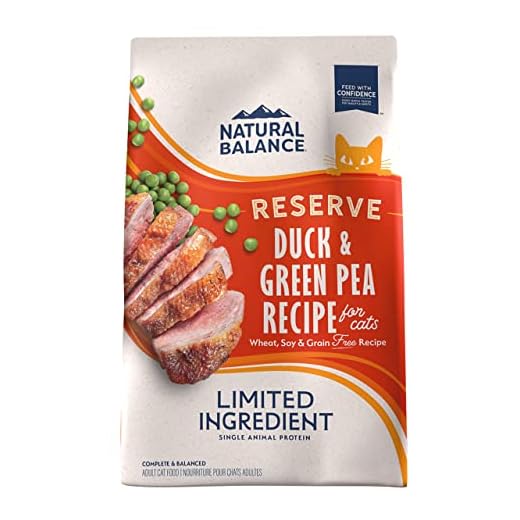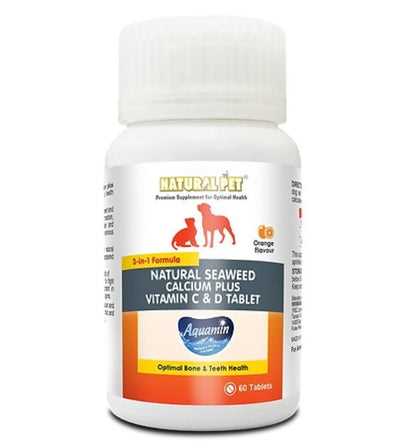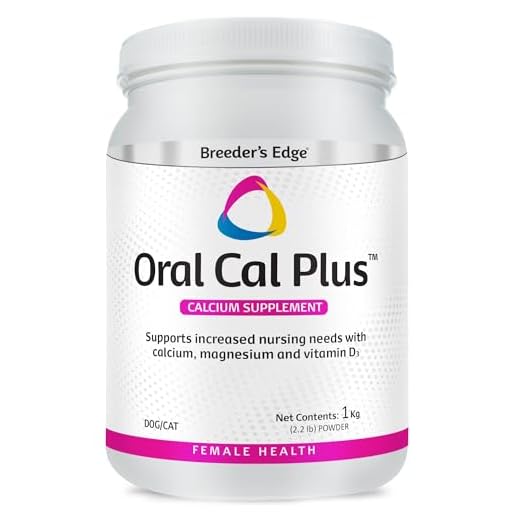




High-quality supplements are necessary for maintaining strong bones and overall health in your feline companion. This article provides guidance on selecting the most suitable products to ensure your pet receives adequate nutritional support. It includes information on various types, sources, and dosages that can benefit your pet’s well-being.
This guide is beneficial for cat owners looking to enhance their pet’s diet or address potential deficiencies. It offers insights into the best options available in the market, helping you make informed decisions about your pet’s nutrition.
Key topics covered include the importance of specific nutrients, the differences between natural and synthetic options, and expert recommendations on dosages based on your cat’s age and health status. By the end of this article, you’ll have a clear understanding of how to choose the right supplement to promote a healthy lifestyle for your beloved feline.
Best Calcium for Cats
Providing an adequate supply of this mineral is crucial for maintaining strong bones and teeth in felines. It plays a significant role in various bodily functions, including muscle contractions and nerve signaling.
To ensure your pet receives sufficient amounts, consider incorporating high-quality dietary sources. Natural options, such as dairy products, can be beneficial, but it’s essential to monitor lactose intolerance, which is common in many cats. Additionally, supplements may be necessary in certain cases, particularly for those with specific health concerns or dietary restrictions.
Key Considerations
When selecting a product, pay attention to the following:
- Bioavailability: Choose supplements that are easily absorbed by the body.
- Formulation: Products in liquid or chewable forms may be more palatable for some felines.
- Dosage: Consult with a veterinarian to determine the appropriate amount based on your pet’s age, weight, and health status.
Monitoring your pet’s health after introducing any new supplement is essential. Look for signs of improvement in energy levels, coat condition, and overall well-being.
Understanding Calcium Needs in Feline Diets
The dietary requirements for mineral intake in felines are significant, particularly for bone health and overall well-being. A balanced meal should include an appropriate amount of this mineral to support various physiological functions, such as muscle contractions and nerve signaling.
Natural sources rich in this mineral, like specific meats and fish, contribute to a feline’s nutritional needs. Ensuring that meals contain these ingredients can help maintain optimal health and prevent deficiencies.
Sources and Functions
When considering dietary sources, it is essential to recognize that not all food products provide the same levels of this mineral. Animal-based proteins generally offer a higher bioavailability, which means that the body can effectively absorb and utilize them.
- Meat: Chicken, beef, and fish are excellent sources.
- Dairy: Some felines may tolerate small amounts of cheese or yogurt.
- Supplements: Certain formulations can help bridge any gaps in a feline’s diet.
Inadequate intake may lead to various health issues, including:
- Bone density problems, leading to fractures.
- Muscle weakness or spasms.
- Neurological issues affecting coordination.
| Health Issue | Symptoms |
|---|---|
| Bone Density Problems | Fractures, pain while moving |
| Muscle Weakness | Tremors, fatigue |
| Neurological Issues | Uncoordinated movements, twitching |
Consulting with a veterinarian for personalized dietary recommendations is advisable to ensure that a feline receives the necessary nutrients in appropriate proportions.
Calcium Supplements for Cat Health
Providing adequate mineral support is paramount for maintaining optimal health in felines. A variety of dietary enhancements can deliver the necessary nutrients to ensure strong bones and overall wellness.
When selecting a mineral addition, prioritize formulas that contain easily absorbable forms. Chewable tablets, powders mixed with food, or liquid solutions can be effective, depending on the preferences of your pet.
Recommended Ingredients
Look for supplements that include:
- Calcium carbonate: Commonly used, it offers a concentrated dose of mineral support.
- Calcium citrate: More easily absorbed, making it suitable for older or sensitive animals.
- Phosphorus: Works synergistically with calcium to promote bone density.
- Vitamin D3: Essential for proper calcium absorption and utilization.
Consult a veterinarian to determine the appropriate dosage based on your pet’s age, weight, and health status. Regular monitoring is advisable to assess any changes in behavior or health after introducing a new supplement.
Additional Considerations
Incorporating natural food sources can also enhance mineral intake. Some options include:
- Dairy products: Small amounts can provide a good source, but monitor for lactose intolerance.
- Fish: Sardines and salmon are beneficial not only for minerals but also for omega fatty acids.
- Bone meal: A natural addition that may enrich the diet but should be used carefully to avoid excess.
Maintaining a balanced diet rich in essential nutrients is key to promoting long-term health. Regular veterinary check-ups will help ensure your feline companion thrives.
Natural Sources of Calcium for Cats
Incorporating natural sources of mineral content into your feline’s diet can significantly enhance their overall health. Fish, particularly species like sardines and salmon, provide not only protein but also a rich supply of this important nutrient.
Another excellent option is dairy products. While some felines may be lactose intolerant, small amounts of yogurt or cheese can be beneficial. Always monitor for any adverse reactions when introducing new items into their meals.
Recommended Natural Sources
- Fish: Sardines and salmon are rich in both protein and essential minerals.
- Eggs: Cooked eggs offer a complete protein source along with various nutrients.
- Leafy Greens: Certain greens like kale and spinach contain calcium, though they should be given in moderation.
- Bone Meal: A natural supplement that can be added to homemade diets for increased mineral content.
When considering these natural options, ensure they are prepared appropriately to maintain their nutritional value. Cooking fish and eggs is advisable, while greens should be washed thoroughly to remove any pesticides.
Consulting with a veterinarian can provide tailored guidance based on your pet’s specific needs and dietary preferences.
Signs of Calcium Deficiency in Cats
Observing a lack of certain nutrients can be critical in maintaining your pet’s health. A shortage of this mineral can lead to various physical and behavioral changes in your feline companion.
Common indicators of this deficiency include muscle tremors, weakness, and an increased propensity for fractures. If your pet exhibits these symptoms, it’s essential to consult with a veterinarian.
Physical Symptoms
Physical signs can manifest in several ways. You might notice:
- Weak Bones: Increased likelihood of fractures or difficulty in jumping.
- Dental Issues: Poor dental health can be a result of inadequate mineral levels.
- Muscle Spasms: Uncontrolled twitching or tremors in the muscles.
Behavioral Changes
Behavioral alterations are also telling signs. Watch for:
- Lethargy: Reduced energy levels and less interest in play.
- Restlessness: Unusual pacing or inability to settle down.
- Changes in Appetite: Either increased or decreased food intake can indicate health issues.
Regular veterinary check-ups and appropriate dietary adjustments can help prevent these symptoms and ensure a healthy lifestyle for your pet.
How to Choose the Right Calcium Product
Selecting the appropriate mineral supplement requires careful evaluation of several factors. First, consider the form of the supplement. Options include powders, tablets, and liquids. Each form has its pros and cons, influencing absorption rates and ease of administration.
Secondly, assess the source of the mineral. Natural sources, such as oyster shell or limestone, may be preferable for some pets. Synthetic options can provide specific dosages and purity but may lack certain trace elements found in natural sources.
Key Factors to Consider
- Dosage: Consult with a veterinarian to determine the right amount needed based on your pet’s age, weight, and health status.
- Bioavailability: Look for products with high absorption rates to ensure your pet gets the maximum benefit.
- Additives: Check for any additional ingredients that may enhance or hinder the effectiveness of the supplement.
- Reputation: Research the manufacturer’s credibility and read reviews from other pet owners.
In addition to these factors, keep an eye on your pet’s response to the supplement. Monitor for any signs of intolerance or adverse reactions. Adjustments may be necessary to find the ideal product that supports health without causing discomfort.
Ultimately, making an informed choice requires a combination of research and professional guidance. This approach ensures the selected mineral supplement aligns with your pet’s specific health needs.
Administering Calcium Safely to Your Cat
Consult a veterinarian before introducing any supplements into your feline’s diet. The recommended dosage will depend on various factors, including age, weight, and overall health. Never exceed the advised amount, as high levels can lead to serious health issues.
Monitor your pet closely when introducing new products. Look for signs of gastrointestinal upset or allergic reactions, such as vomiting, diarrhea, or unusual lethargy. If any adverse symptoms occur, discontinue use immediately and consult your veterinarian.
Key Guidelines for Safe Supplementation
- Consult a Vet: Always seek professional advice before adding any supplements.
- Follow Dosage Instructions: Stick to the veterinarian’s recommendations to avoid toxicity.
- Choose Quality Products: Opt for reputable brands with transparent ingredient lists and third-party testing.
- Watch for Reactions: Monitor your pet’s behavior and health after starting any new supplement.
- Provide a Balanced Diet: Ensure that your feline’s regular food is nutritionally complete to minimize the need for additional products.
By adhering to these guidelines, you can help ensure that your furry friend receives the necessary nutrients without compromising their health. Always prioritize safety and consult with professionals when in doubt.
Best calcium for cats
Features
| Part Number | Rev-6197 |
| Model | Rev-6197 |
| Is Adult Product | |
| Size | 700 gm- Granules |
Features
| Part Number | 4000033 |
| Model | SeaCal340g |
| Color | Multi-colored |
| Size | 12 Ounce (Pack of 2) |
Features
| Part Number | MV-2001-sizes |
| Model | 1 |
| Warranty | 365 days |
| Size | 32 oz |
Features
| Part Number | 064992203139 |
| Model | F2B100031K01800 |
| Color | Blue |
| Release Date | 2019-03-01T00:00:01Z |
| Size | 12 Pound (Pack of 1) |
Features
| Part Number | NB52510 |
| Model | 52510 |
| Color | Blacks & Grays |
| Size | 10 Pound (Pack of 1) |
Features
| Size | 1kg |
Features
| Part Number | 138587/01-434511 |
| Model | 138587/01-434511 |
| Size | 1 Count (Pack of 1) |
Features
| Is Adult Product | |
| Size | 4.25oz (Pack of 3) |
Video:
FAQ:
What are the best sources of calcium for cats?
Calcium can be obtained from various sources suitable for cats. Some of the best include high-quality commercial cat foods that are specifically formulated to meet feline nutritional needs. These foods often contain calcium derived from meat, bone meal, and fish. Additionally, you can consider supplements that are specifically designed for cats, such as calcium carbonate or calcium citrate. Natural sources like cooked bones (without sharp edges) and dairy products like yogurt can also provide calcium, but they should be given in moderation and under the guidance of a veterinarian.
How much calcium do cats need daily?
The daily calcium requirement for cats varies depending on their age, size, and health status. Generally, adult cats require about 0.5% to 1% of their total diet to be calcium. Kittens, on the other hand, have higher needs for growth and development, typically around 1% to 1.5% of their diet. It is important to consult with a veterinarian to determine the appropriate calcium intake for your cat, especially if they are pregnant, nursing, or have specific health conditions.
Can cats get enough calcium from their diet alone?
Most commercial cat foods are formulated to provide adequate calcium levels for healthy cats. However, if a cat is on a homemade diet, it may be challenging to meet their calcium needs without careful planning. It’s important to ensure that any homemade diet includes appropriate calcium sources or supplements. Consulting with a veterinary nutritionist can help create a balanced diet that meets all of your cat’s nutritional requirements, including calcium.
Are there any risks associated with calcium supplements for cats?
Yes, there are potential risks associated with calcium supplements. Over-supplementation can lead to hypercalcemia, a condition that can cause various health issues, including kidney problems and urinary tract disorders. Symptoms of excess calcium may include lethargy, vomiting, and increased thirst. It is crucial to consult a veterinarian before starting any supplement regimen to ensure it is necessary and safe for your cat.
What are the signs of calcium deficiency in cats?
Calcium deficiency in cats can lead to several health issues. Some common signs include muscle twitching, seizures, lethargy, and brittle bones. In kittens, a deficiency can result in developmental issues and poor growth. If you suspect your cat may be lacking calcium, it’s important to seek veterinary advice promptly to diagnose the issue and discuss appropriate dietary changes or supplements.












